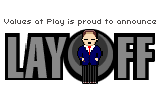Massively Multiplayer Soba
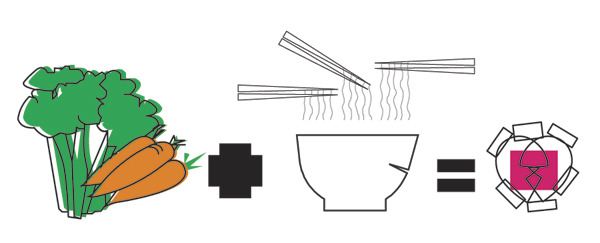
Soba, the Game:
Grab some friends and traverse remarkable neighborhoods in New York City…. Talk to strangers, find clues, and fetch ingredients for a giant collective dinner party!
Massively Multiplayer Soba is a team-based urban game focused on culture, food and language. This game-event entices players to the non-tourist neighborhoods of New York.
Massively Multiplayer Soba combines play with opportunities to mix with new places in the city, creating unexpected encounters with residents while challenging concepts of culture and language through storytelling and discovery!
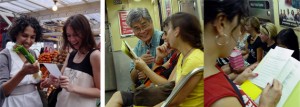
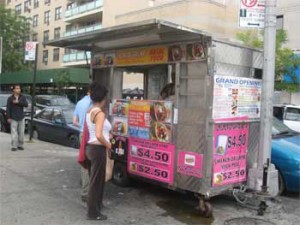
MassivelyMultiplayerSoba Ingredient Hunting
Confessions of a player of Massively Multiplayer Soba
“Join us on a food odyssey through New York City. People will sing you songs about food and it’s going to end in a big secret noodle party.” This is what players were told at New York City’s 2008 Conflux festival, where we hosted our first public Massively Multiplayer Soba (MMS) game. MMS is a team-based urban game that invites players to explore cultures and foods they may not encounter in their day-to-day lives. This version of the game sent players into Jackson Heights, arguably the most diverse neighborhood in the world, with a population of over 46% foreign residents speaking more than 40 languages. The game is designed so that players engage in deep and meaningful interactions with neighborhood residents, and learn about the role that food plays in residents’ lives and cultures.
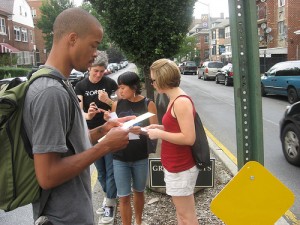
The group of players at the Conflux festival was a mix of artists, journalists, game designers, and students. They were split into teams of 4 or 5, and sent out into Queens with a mission: Each group had to procure some recipe ingredients that were needed for that night’s Soba cookout (i.e. secret noodle party) at the Queens Diversity Center.
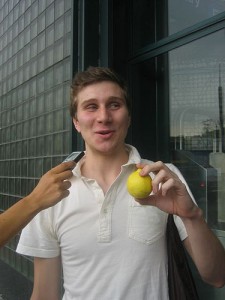
MassivelyMultiplayerSoba The personal history of a lemon
Each correct ingredient brought back to the cookout was worth 100 points – the teams were competing for a gift certificate to a local restaurant. More importantly, if the teams didn’t bring back the right ingredients, the noodles wouldn’t taste quite right!
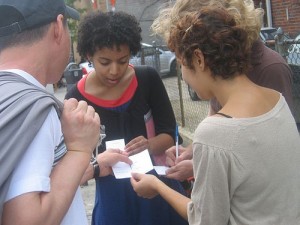
The task was more difficult than it seems – the recipe ingredients were printed in a variety of non-English languages, such as Hindi, Hebrew, and Japanese. It would be tricky for teams of Soba players to find the right ingredients without getting some help from the linguistically diverse residents of Jackson Heights!
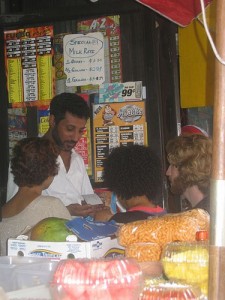
This was more challenging than it first appears. Imagine wandering an unfamiliar neighborhood with a shopping list written in languages that use non-Roman alphabets. Who do you ask for help? Sometimes, a group would approach people who “looked” like Hindi speakers only to find out that they were actually Punjabi, or vice versa. These kinds of experiences resonated with the players. Often, when we think of diversity we focus on its physical manifestations, such as culturally specific clothing or hair styles. What becomes clear in the game is that in order to appreciate the diversity of a neighborhood, you have to interact with residents. Passively watching may leave you with an inaccurate understanding of the nature of its diversity.
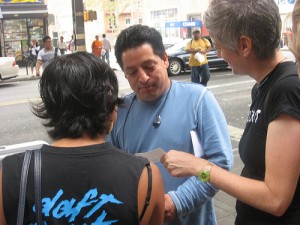
Most teams found all the right ingredients, thanks to the help of people found in supermarkets, restaurants, and on the street. But teams were also awarded points for asking residents food and culture related questions: What is your favorite food from childhood and why? Do you still eat it? What is your favorite holiday food? Can you name any songs about food? If you were a food what would you be? Can you act out what it would be like to be this food? The teams got answers to these questions, both silly (one woman entertained a group of players by pantomiming what it would be like to be a mushroom) and serious (a man told a sad story about preparing a favorite dish for his crush, only to be heartbroken when she didn’t show up).
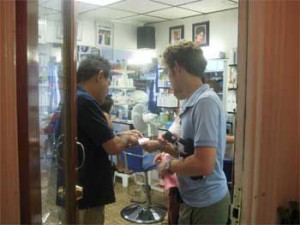
In response to the Soba teams’ questions, Jackson heights residents told a fantastic variety of stories about the role that food plays in their lives and cultures. These stories were captured by teams on audio recorders, and were played after the “official” game play to the entire group of players at the Soba dinner. The result was a fascinating tapestry of residents’ memories of holiday memories, comfort foods cooked by Mom and Dad, romantic meals, and family gatherings. Listening to these stories of the role that food plays in these people’s cultures and lives, most players couldn’t help but think of how similar they were to the stories they would tell themselves. The overall effect is hard to describe to people who haven’t yet participated – but the game brings out a strong undercurrent of shared experiences. We celebrate the neighborhood’s diversity and difference, but perhaps even more so we celebrate the ways in which we are the same.
MMS teams could also score points by answering questions about Jackson Heights’ rich cultural history. Answering these questions required that teams search out landmarks in the neighborhood that told important cultural stories. For example, the questions brought teams to sites of community activism, streets that had been named after important neighborhood figures, and places where notable cultural events had occurred. Scurrying around the neighborhood, searching out the history in old buildings, restaurants, street names, statues and plaques – this added another dimension to the MMS experience. We pass these landmarks every day, but rarely give them a second glance. Being alert to history in this way makes walking through the neighborhood a completely different experience. This is especially the case in Jackson Heights, where residents have been negotiating and celebrating their impressive diversity for over a century.
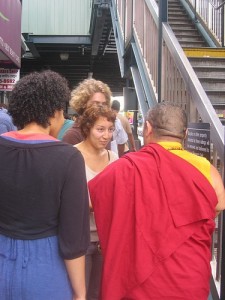
Massively Multiplayer Soba Players Interview a Monk
Finally, teams could score points by bringing someone from Jackson Heights back to the cookout. Only one team managed to do this – but everyone was thrilled to meet their guest, Salvador, a charming, relaxed, friendly, and talkative fellow they met in a restaurant. This may have been the highlight of MMS – while it was exciting to explore the neighborhood, and meet some of the people who live there, the experience is richer to the degree that residents participate in all aspects of the game, including the cookout! The scoring system is now being altered to give teams even more incentive to bring back guests – so we hope to make many more friends in Jackson Heights!
The general consensus was that the game was a lot of fun – but we set out to make much more than a fun game. In designing MMS, our goals were to create an experience that affirms the value of diversity. The game elicits a particular type of “diversity experience”. We go out into the neighborhood to learn about people’s cultural differences – the foods they eat, the holidays they celebrate and so forth. But part of what we enjoy most is hearing their stories, and relating to them on a very deep level. So perhaps one of the “messages” inherent in the game is that to celebrate our diversity, we also have to really appreciate the ways in which we are similar – a nice message but even nicer when served with noodles!
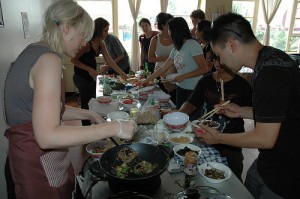
MassivelyMultiplayerSoba Flanagan Cooks


